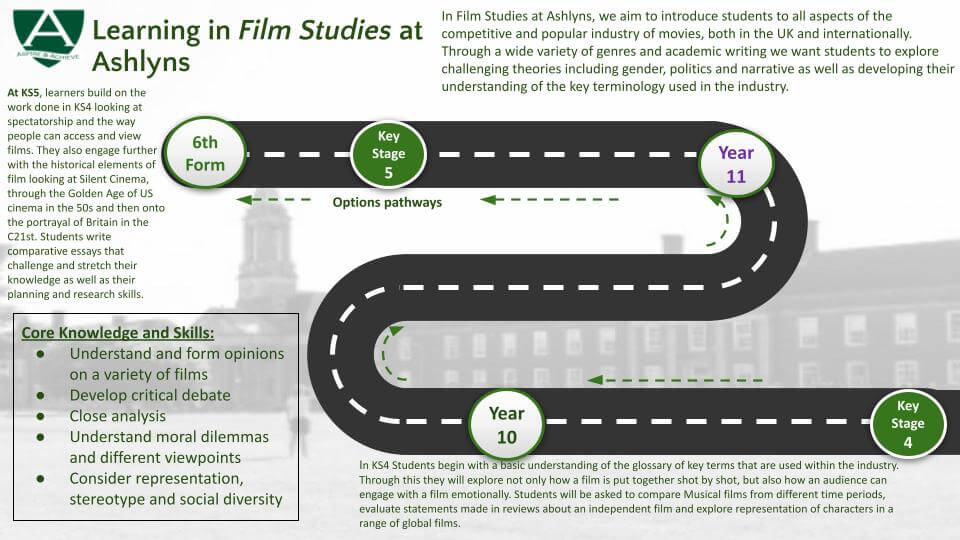Film Studies
In Film Studies at Ashlyns, we aim to introduce students to all aspects of the competitive and popular industry of movies, both in the UK and internationally. Through a wide variety of genres and academic writing we want students to explore challenging theories including gender, politics and narrative as well as developing their understanding of the key terminology used in the industry. Our hope is that by studying films, not just watching them, they can then use that understanding to produce their own pre-production and production materials to a near-professional standard. Our curriculum has been carefully chosen to engage students of all abilities and build appreciation for the way cinema has pushed technology to the format that many people go and see today.

Key Stage 4
Students at GCSE will begin with a basic understanding of the glossary of key terms that are used within the industry. Through this they will explore not only how a film is put together shot by shot, but also how an audience can engage with a film emotionally. Students will be asked to compare Musical films from different time periods, evaluate statements made in reviews about an independent film and explore representation of characters in a range of global films.
The assessment opportunities at GCSE include short and longer answers across two papers and also a 30% NEA on the Eduqas specification, which is a wonderful chance for students to develop either an extract from a professional looking screenplay or make an extract from a film. These practical skills are also a great chance for students to start building a portfolio that demonstrates their imagination and ability to work independently on a project that they have control over and care about.
Key Stage 5
Key Stage 5 Film Studies builds on the work done in the GCSE looking at spectatorship and the way people can access and view films. They also engage further with the historical elements of film looking at Silent Cinema, through to the Golden Age of US cinema in the 50s and then onto the portrayal of Britain in the C21st. Students are asked to write comparative essays that challenge and stretch their knowledge as well as their planning and research skills. They are also encouraged to study further film theory including Marxism and Auteurship which has many cross curricular links with subjects such as Sociology, English or History.
Many of our past students have gone to study Film Studies at Higher education establishments or have entered the industry directly through apprenticeships and internships and have benefited from the wide range of topics covered in the curriculum.
Learning Beyond the Classroom
Students of Film Studies are always encouraged to expand their knowledge of the media outside of the classroom to develop their understanding of the relationship between Film and the world. There are many opportunities to enter writing and film competitions either through the BBC Writer’s Room or the Moving Image Awards. Exploring a range of films that are not the specification is also key to forming opinions and evaluation the art of films. There are also chances to be connected with people in the industry through mentorship programmes which we hope we can expand in future years.
We have also put in place a challenge curriculum designed for students to complete in their own time which suggests museums, tours and further reading activities to push their interests as far as they can go and see how Film Studies operates in the real world away from a screen.

